Table of Contents
Home / Blog / NFT Marketplace
How Much Does NFT Marketplace Development Cost?
November 3, 2023

November 3, 2023
In the blink of an eye, the NFT market grew by a staggering 2,200% in February 2021 and witnessed an overall 400% surge over the past year. This crypto-driven frenzy saw NFTs of all kinds, from art and music to memes and computer code, vanishing off the shelves in mere moments. The market’s gravitational pull even attracted celebrities keen on tokenizing their creations. So now, one question lingers: How much does it truly cost to construct an NFT marketplace?
Well, like many things in the blockchain space, there is no one-size-fits-all answer. The cost of NFT marketplace development can fluctuate significantly based on a multitude of factors. Drawing from our expertise and past projects for clients, the cost to build an NFT marketplace typically ranges from $50,000 to $450,000.
In this article, we will discuss the factors that influence the ultimate cost of NFT marketplace development, equipping you with the knowledge to estimate your own NFT marketplace’s development expenses effectively.
What is an NFT Marketplace?
Before we go into the financial aspect, it’s crucial to understand the essence of an NFT marketplace. NFT marketplaces are digital platforms that serve as the bridge between creators and collectors of NFTs. These marketplaces allow artists, gamers, and content creators to mint NFTs and offer them to a global audience of collectors. They are not only the gateway to this burgeoning world but also the marketplace for digital treasures.
Different Types of NFT Marketplaces
Not all NFT marketplaces are created equal. They come in various shapes and sizes, catering to different niches and audiences. The three primary types of NFT marketplaces are:
Certainly, let’s delve deeper into the three primary types of NFT marketplaces:
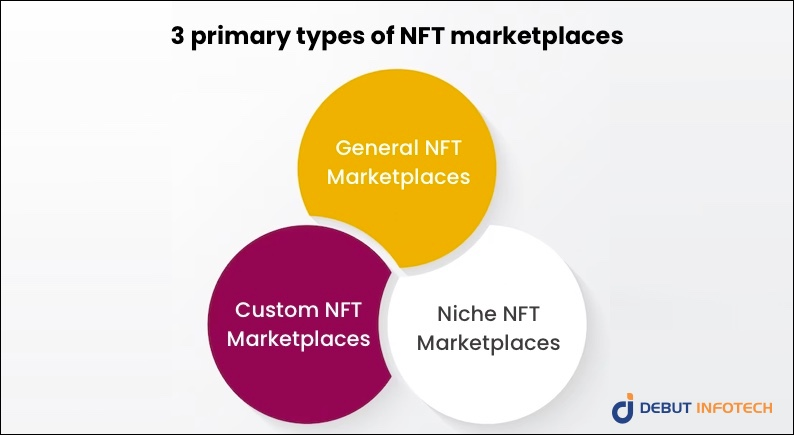
1. General NFT Marketplaces
General NFT marketplaces are versatile platforms designed to accommodate a wide range of NFT categories and creators. They offer the best NFT marketplace for artists, collectors, gamers, and enthusiasts from various niches who can list, buy, and trade NFTs. General NFT marketplaces are often the first stop for beginners looking to explore the NFT world.
OpenSea, Rarible, SuperRare, and Mintable are prominent general NFT marketplaces. OpenSea, in particular, has become one of the most recognized names in the NFT space, serving as a marketplace for digital art, virtual real estate, music, and more.
2. Niche NFT Marketplaces
Niche NFT marketplaces, as the name suggests, cater to specific niches or industries. They target a particular group of creators and collectors who share a common interest. These platforms often offer features and functionalities tailored to their niche, providing a specialized experience for users.
Niche NFT marketplaces can be found in various sectors. For instance, Zora focuses on digital art and offers creators the ability to embed unlockable content within their NFTs. Audius caters to musicians, allowing them to tokenize their music. Nifty Gateway specializes in digital art and collectibles.
3. Custom NFT Marketplaces
Custom NFT marketplaces are platforms built for specific purposes, brands, or industries. They offer a high degree of customization and personalization to meet unique requirements. These marketplaces are often created by organizations or entrepreneurs seeking to provide a tailored experience to their users.
NBA Top Shot, a project by Dapper Labs, is a prime example of a custom NFT marketplace. It’s designed specifically for the NBA and basketball enthusiasts, allowing them to buy, sell, and trade officially licensed NBA collectible highlights. Another example is Ethernity Chain, which focuses on connecting the crypto community with pop culture through unique NFTs.
Each of these marketplace types caters to distinct user bases and can serve various purposes. General NFT marketplaces provide a broad range of options for those exploring NFTs, while niche and custom marketplaces offer specialized experiences that cater to specific interests and industries. The choice of marketplace type depends on your target audience and the nature of the NFTs you aim to offer.
Benefits of Developing an NFT Marketplace
The NFT marketplace industry is booming, and for good reason. Developing an NFT marketplace comes with a range of benefits, both for creators and entrepreneurs. Some of the advantages include:
Generating revenue: NFT marketplaces commonly levy fees on transactions, ensuring a steady income flow.
Enabling Creators: These platforms offer artists and content creators the ability to earn directly from their work, bypassing intermediaries.
Cultivating Communities: Virtual NFT marketplaces cultivate groups of collectors and creators, nurturing a lively ecosystem.
Innovative Possibilities: An innovative technology behind NFTs allows for creative use cases, such as virtual NFT real estate and ownership of virtual items in video games.
Factors That Affect the Cost of NFT Marketplace Development
Developing an NFT marketplace is a complex undertaking, and the costs can vary significantly based on various factors. Here are the key considerations that affect the cost of development:
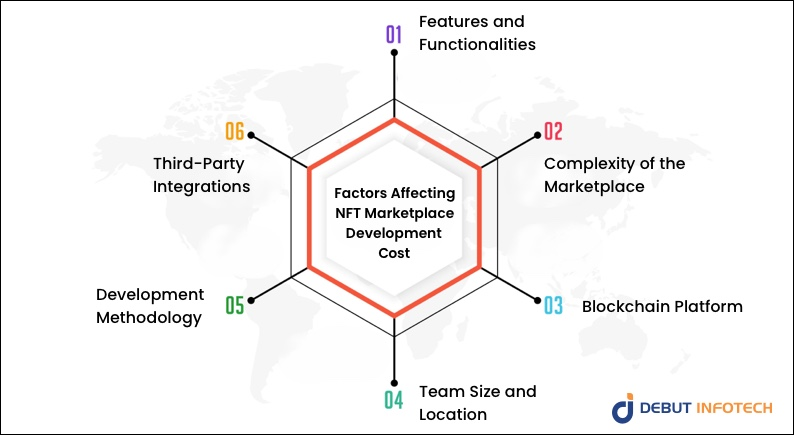
1. Features and Functionalities
The extent of features and functionalities you wish to incorporate into your NFT marketplace plays a substantial role in determining the overall cost. Features like listing, bidding, a user-friendly interface, search functionality, and robust user profiles all contribute to the complexity and, subsequently, the cost.
2. Complexity of the Marketplace
The complexity of your NFT marketplace, including the number of different asset types it supports, the intricacy of the smart contracts, and the scalability of the platform, will impact costs. A marketplace focused solely on digital art will be less complex than one dealing with virtual real estate.
3. Blockchain Platform
Your choice of a blockchain platform can significantly influence development costs. Ethereum is the most popular choice, but it comes with higher gas fees. Platforms like Binance Smart Chain or Flow may offer a more cost-effective solution for certain projects.
4. Team Size and Location
The size of your development team and their location can also affect costs. Hiring developers in regions with lower labor costs may be more budget-friendly, but it’s essential to maintain quality and communication standards.
5. Development Methodology
The development methodology you choose, whether it’s Agile, Waterfall, or another approach, will impact both the timeline and costs. Agile, for instance, allows for iterative development but may result in higher overall expenses.
6. Third-Party Integrations
If you plan to integrate third-party services like payment gateways, blockchain wallets, or analytics tools, these integrations can add to the overall development cost.
Estimated Cost of Developing an NFT Marketplace
Estimating the cost of NFT marketplace development is a challenging task due to the wide range of variables involved. However, we can provide a rough estimate based on the complexity of the project:
1. Simple NFT Marketplace: $50,000 to $100,000
A basic NFT marketplace with essential features, a straightforward smart contract, and minimal customization falls into this category. The development cost covers the creation of a user-friendly interface, simple asset listing, and basic wallet integration.
2. Medium-Complexity NFT Marketplace: $100,000 to $250,000
For a marketplace with more advanced features, a well-structured smart contract, and a user-friendly interface, you should budget in this range. This category includes additional features like advanced search functionality, multiple asset types, and enhanced wallet integration.
3. Complex NFT Marketplace: $250,000 to $500,000
If you’re aiming for a highly complex marketplace with advanced features, multi-chain support, extensive customization, and robust security measures, expect costs in this range. Complex marketplaces may also require scalability features and comprehensive user profiles.
Tips for Reducing the Cost of NFT Marketplace Development
While the costs of NFT marketplace development can be substantial, there are ways to optimize your budget and create a successful platform without overspending:
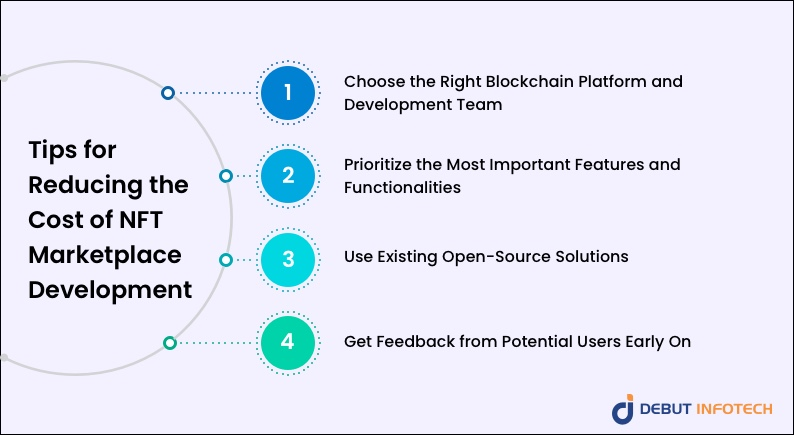
1. Choose the Right Blockchain Platform and Development Team
Select a blockchain platform that aligns with your project’s goals and budget. Additionally, consider hiring a skilled development team with expertise in NFT marketplace development to ensure efficient execution. Outsourcing development to regions with lower labor costs can also be cost-effective, but quality and communication must be closely managed.
2. Prioritize the Most Important Features and Functionalities
Focus on the core features that are essential for your marketplace’s success. You can always add more features in the future as your platform grows. Prioritizing features can help you launch your marketplace faster and within budget.
3. Use Existing Open-Source Solutions
Leverage open-source tools and solutions to save development time and costs. Many blockchain-related libraries and frameworks are available for free or at a minimal cost. By utilizing existing solutions, you can expedite development and reduce costs associated with reinventing the wheel.
4. Get Feedback from Potential Users Early On
Engage potential users and creators in the development process. Their feedback can help you identify and address issues before they become costly problems. By conducting thorough user testing and iterating on your marketplace’s features based on feedback, you can reduce the likelihood of costly post-launch fixes and revisions.
Case Studies of Successful NFT Marketplaces
Examining the success stories of the existing biggest NFT marketplaces can provide valuable insights into the potential costs and benefits of such ventures. Here are a few notable examples:
1. OpenSea
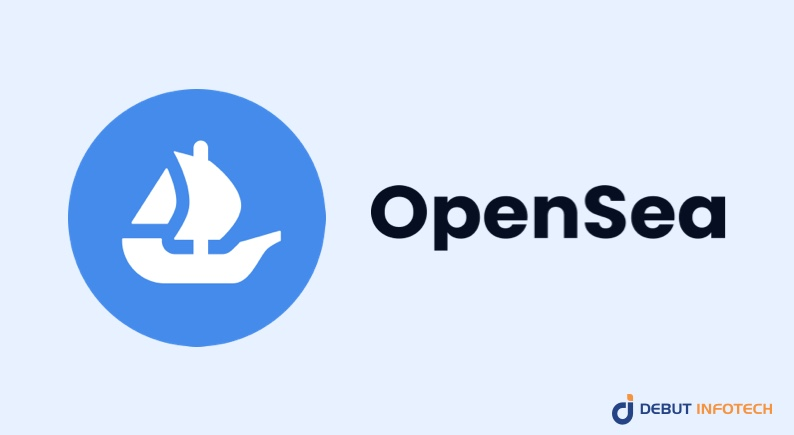
OpenSea, one of the most well-known NFT marketplaces, started as a simple platform for buying and selling NFTs. Over time, it added features and functionalities that made it more complex. While the initial development costs were relatively low, their ongoing success has allowed for further investment in the platform’s growth and security.
2. Rarible
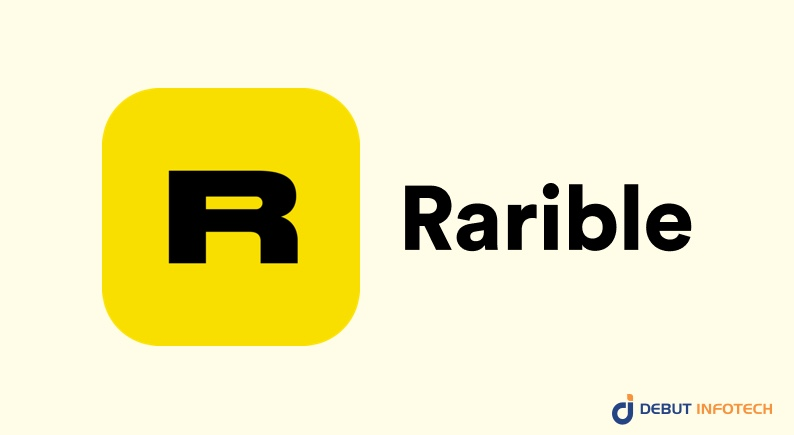
Rarible, a niche NFT marketplace focused on digital art and collectibles, managed to gain prominence by catering to a specific audience. Their focus on customization and unique features within the marketplace contributed to a medium-complexity development cost. They began with a basic platform and iteratively added features as they gained user traction and financial resources.
3. NBA Top Shot
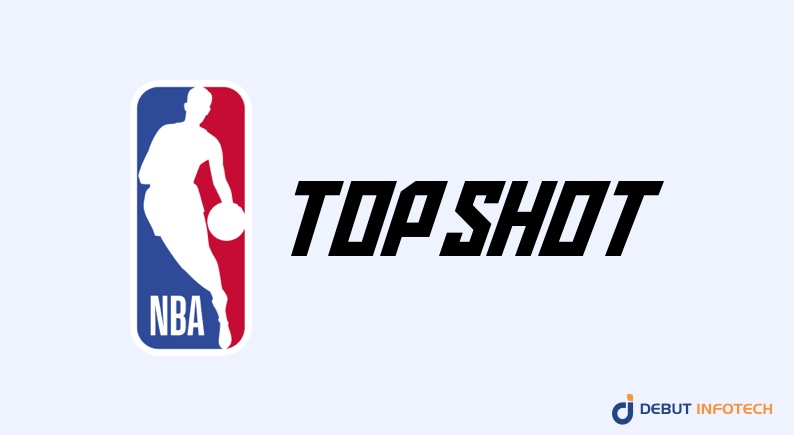
NBA Top Shot is a prime example of a custom NFT marketplace tailored for a specific purpose. Their development costs were likely on the higher end of the spectrum due to the specialized nature of their project. Custom marketplaces like NBA Top Shot require significant resources and expertise to create unique experiences for users.
In conclusion, NFT marketplaces are a dynamic space with incredible potential for both creators and entrepreneurs. While the costs of developing such a platform can vary widely, careful planning, the right development team, and a focus on essential features can help you navigate the complexities and bring your NFT marketplace vision to life. As the NFT space continues to evolve, staying informed and adaptable is key to success.
How Debut Infotech Can Help In NFT Marketplace Development?
If you’re considering building your very own NFT marketplace, Debut Infotech stands ready to assist you with the process. Our team of experts specializes in NFT marketplace development, offering services such as smart contract creation, blockchain integration, security audits, and user-friendly interface design. Let’s turn your NFT marketplace vision into reality. Contact us today to get started!
FAQs
Q. What are the key cost components in NFT marketplace development?
A. The primary cost components in NFT marketplace development include blockchain integration, smart contract development, front-end and back-end development, user authentication, security measures, and ongoing maintenance. The exact cost depends on the project’s complexity and desired features.
Q. How does the choice of blockchain impact the development cost of an NFT marketplace?
A. The choice of blockchain significantly influences the NFT Marketplace price. Ethereum, for example, has higher gas fees, which can increase transaction costs. Binance Smart Chain and other blockchains may offer cost-effective alternatives. Custom blockchains can be more expensive upfront but may save costs in the long run.
Q. What features can impact the cost of NFT marketplace development?
A. Features like NFT minting, listing, buying, selling, auctions, royalties, and custom smart contracts can affect development costs. The more advanced and intricate the features, the higher the development cost is likely to be.
Q. Are there any hidden or ongoing costs when developing an NFT marketplace?
A. Yes, in addition to the initial development cost, you should budget for ongoing operational costs. These include server hosting, blockchain transaction fees, periodic updates, security audits, and user support. These ongoing costs are essential for the sustainable operation of your NFT marketplace.
Q. How can I reduce the development cost of my NFT marketplace without compromising quality?
A. To reduce development costs, consider using open-source solutions and existing templates when applicable. Collaborating with an experienced development team can help optimize the development process and minimize unnecessary expenses. Additionally, thorough planning and clear project scope can prevent cost overruns and delays in your NFT marketplace development project.
Talk With Our Expert
Our Latest Insights
USA
Debut Infotech Global Services LLC
2102 Linden LN, Palatine, IL 60067
+1-708-515-4004
info@debutinfotech.com
UK
Debut Infotech Pvt Ltd
7 Pound Close, Yarnton, Oxfordshire, OX51QG
+44-770-304-0079
info@debutinfotech.com
Canada
Debut Infotech Pvt Ltd
326 Parkvale Drive, Kitchener, ON N2R1Y7
+1-708-515-4004
info@debutinfotech.com
INDIA
Debut Infotech Pvt Ltd
Sector 101-A, Plot No: I-42, IT City Rd, JLPL Industrial Area, Mohali, PB 140306
9888402396
info@debutinfotech.com



Leave a Comment